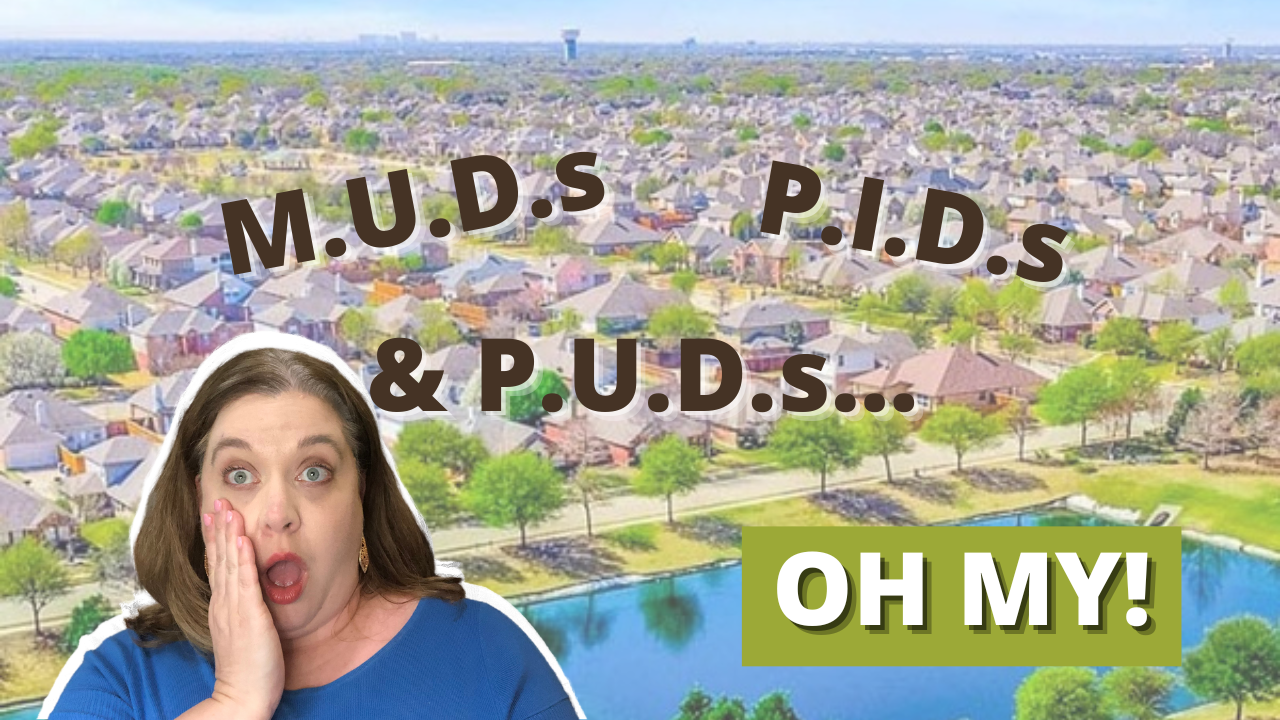Have you ever heard of MUDs, PIDs, and PUDs? No, we’re not talking about a strange new language or the latest tech acronym. These terms represent a fascinating realm of additional taxes and fees that homeowners in the state of Texas might encounter. Don’t worry if these concepts seem confusing at first – we’re here to demystify the alphabet soup and provide you with a clear understanding of what these terms mean and how they can impact you as a homeowner.

MUDs: A Closer Look at Municipal Utility Districts
Let’s kick things off by examining MUDs – Municipal Utility Districts. If you’ve ever wondered what’s behind the scenes when it comes to the infrastructure of a neighborhood, MUDs play a crucial role. A MUD is essentially a separate taxing entity established by developers in Texas neighborhoods. Its purpose? To recuperate the costs associated with setting up crucial infrastructure like water, sewage, and storm drains.
MUDs are approved by the state of Texas and operate under the governance of an elected board of directors. Developers create these districts to pass on the costs of infrastructure development to homeowners until the incurred debt is fully repaid. Particularly common in areas lying outside city jurisdictions, MUDs become the mechanism for footing the bill when cities can’t or won’t extend necessary services to neighborhoods.
In areas like Houston, MUDs are a household name, but they’re increasingly making their presence known in other regions, like the Dallas-Fort Worth area. As urban sprawl continues, MUDs are playing a more significant role in North Texas development.
PIDs: The Plan for Enhanced Communities
Moving on to PIDs – Planned Improvement Districts. Unlike MUDs, PIDs are established within cities or counties, often due to neighborhood demands for additional services not covered by standard municipal provisions. Imagine wanting round-the-clock police presence in your community – a PID is a way to make it happen. Property owners within a PID take the reins of this funding mechanism, agreeing to pay for specific improvements or maintenance that enhance their living environment.
PIDs don’t function as tax entities; instead, they employ special assessments. These assessments can be based on property value or property size, and property owners can choose to pay them all at once or over an extended period. PIDs cover an array of enhancements, from landscaping to security and from water and sewer to parks and sidewalks.
Understanding the Impact on Homeowners
So, how do these concepts affect you as a homeowner, whether you’re selling or buying? The first crucial point to note is that if you’re considering purchasing a property within a MUD or a PID, you’re entitled to be informed of this prior to signing a purchase contract. The state of Texas mandates this disclosure, ensuring transparency in real estate transactions.
MUDs come with the potential to replace city taxes, offering homeowners a different way to contribute to community development. On the other hand, PIDs add an extra layer of assessment on top of standard city taxes. So, when you’re evaluating property tax bills, keep in mind that while MUD taxes might replace city taxes, PID assessments are additional.
Unveiling the PUD
Finally, let’s briefly touch on PUDs – Public Use Districts. Although these don’t have a direct impact on residential homeowners, they’re worth mentioning. PUDs allow developers and cities to create commercial areas that exceed existing zoning laws. Think of it as a workaround to introduce unique developments without undergoing complete rezoning processes. This innovative approach fosters creative growth in areas like the transformation of Collin Creek Mall, combining commercial and residential spaces.
In conclusion, while MUDs, PIDs, and PUDs might seem like a complex trio of concepts, they’re vital components in the world of property development and ownership in Texas. Understanding how these entities operate can make a significant difference for both buyers and sellers. So, next time you hear someone talking about MUDs, PIDs, and PUDs, you can confidently engage in the conversation and share your newfound knowledge about the fascinating world of property taxation and development.

